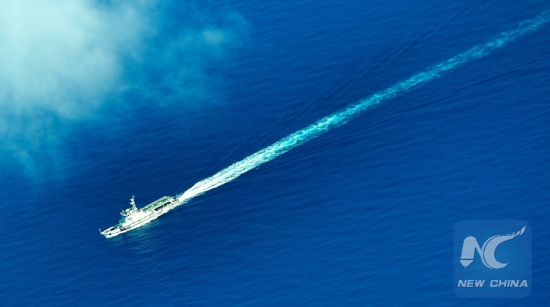
An aerial photo taken on Sept. 25, 2015 from a seaplane of Hainan Maritime Safety Administration shows cruise vessel Haixun 1103 heading to the Yacheng 13-1 drilling rig during a patrol in South China Sea.(Photo: Xinhua/Zhao Yingquan)
The Barack Obama administration's provocative policy in the Pacific is gunboat diplomacy in disguise and may lead to war in the region if not quickly reversed, a U.S. journal warned on Friday.
The article "Prelude to War in the Pacific," published on the latest issue of Executive Intelligence Review, provided a detailed analysis on why the provocative meddling in the Pacific region by the United States is dangerous, why China's territorial claims of the Nansha and Xisha Islands are legitimate, and how the United States is sabotaging the amicable resolution of the regional conflict.
Bylined by the Washington Bureau Chief of the publication William Jones, the article noted that Washington did not sign the UN Law of the Sea Convention, but elaborated its unilateral "freedom of navigation policy" out of the country's own selfish interests.
The policy effectively allows the U.S. Navy to sail wherever and whenever it wants, unimpeded by any treaty, which essentially making U.S. military vessels a modern form of "gunboat diplomacy," wrote Jones.
It denounced Western media for depicting China's claims to the Nansha and Xisha Islands as a Chinese "power grab," arguing that for most of China's history, these claims have never been contested.
Throughout the region's history, extensive activities by Chinese on the islands were present, including fishing and planting, and some Chinese even lived on the islands for years. Many Chinese relics and remains have been found there, including the remains of temples, the article said.
Jones also argued that Chinese possession of the islands would have a beneficial effect on navigation in the region.
"Already China has constructed two lighthouses on Huayang Reef in the Nanshas, and emergency rescue facilities have been established on the Nanshas and Xishas."
The article made an accurate analogy to display the hypocrisy of the U.S. rhetoric.
"Remember that the United States in 1872 sent General John Schofield to the then independent kingdom of Hawaii to investigate those islands for the purpose of eventually putting U.S. military facilities on an advanced perimeter in the Pacific," said the article.
"But the Hawaiian Islands are 2,390 miles from the coast of California, while the Nansha Islands are 500 miles from the Chinese coast and the Xisha only 180 miles. And while the United States had no claim to the Hawaiian Islands (but would soon annex them in rather murky circumstances), China does have such a claim, a claim which was once universally recognized," Jones argued.
Jones believed that countries in the region had a path to peaceful resolution to the conflicts of their territorial claims, but Washington was actively sabotaging the efforts.
"China is clearly aware of the conflicts that have arisen with its neighbors over its attempt to make good on its claims," said Jones in the article. "It is also concerned to maintain amicable relations with its neighbors, and is therefore engaged in coming to agreements with the various claimants through a process of bilateral negotiations."
The article highlighted the agreements between the countries of the region, encapsulated in the 2012 Declaration of Conduct signed by the members of ASEAN and the government of China.
The document calls on the parties "to resolve their territorial and jurisdictional disputes by peaceful means, without resorting to the threat or use of force, through friendly consultations and negotiations by sovereign states directly concerned, in accordance with universally recognized principles of international law, including the 1982 UN Convention on the Law of the Sea."
However, the Philippines has taken the issue to arbitration in its dispute with China. And with the blessing of the United States, the Philippines is hoping that the Permanent Court of Arbitration in The Hague will rule in its favor, said the article.
Jones argued that if the disputes involved only the countries in the region, they could be resolved amicably. "Given the economic strength of China and its clear willingness to use that strength to create a win-win situation for its neighbors -- as we have seen in China's Belt and Road Initiative -- there is no reason that satisfactory arrangements beneficial to all could not be worked out."
The article warned sternly against U.S. provocative policy in the Pacific region, saying that the U.S. invasions of Chinese waters, and the attempts by the United States to create a mini-NATO to target China using the few allies it has in the region, have made an amicable solution impossible.


















































